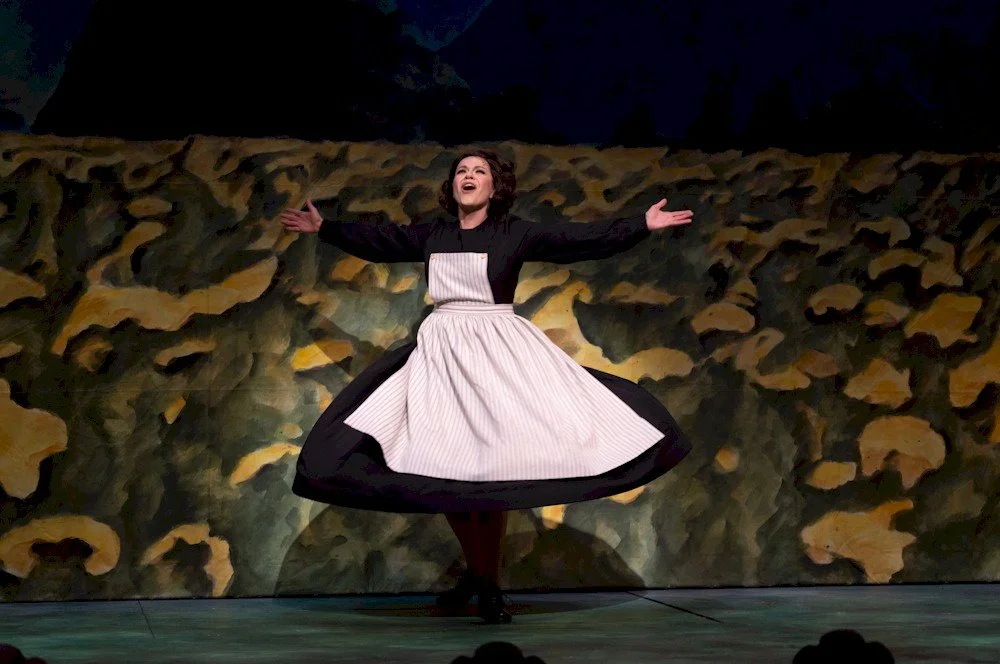Theatre review: The Arts Club's Sound of Music sees a lavish remount, with Chelsea Rose making a mesmerizing Maria
Superb singing carries a show that is polished to the last detail
Chelsea Rose as Maria in The Sound of Music. Photo by Moonrider Productions
The Arts Club Theatre presents The Sound of Music at the Stanley Industrial Alliance Stage until December 24
AFTER A FEW YEARS of being sidelined by the pandemic, the Arts Club Theatre Company has risen up once again to stage a lavish holiday show at the Stanley Theatre, with its breathtakingly beautiful and heartfelt production of The Sound of Music.
A remount of its 2019 show, this rendition seems even more luminous than the original, maintaining the sparkling production values from before, while radiating with fresh interpretations of many roles by new cast members, including the brilliantly talented Chelsea Rose as Maria.
Even before the show begins, audiences are treated to a stunningly beautiful set, a lasting reminder of the artistry of the late designer Drew Facey. It whisks us away not only to an idealist vision of pre-Second World War Austria, with tall, elegant pillars and intricate designs; but also to the classic era of Broadway, with white seashell-adorned footlights and matching proscenium décor that make you feel like you could be at the musical’s Broadway premiere in 1959.
Enchantment is already in the air pre-show and once the house lights dim, the show dazzles at every turn. Under the musical direction of Ken Cormier, the singing is perhaps the most superb I’ve experienced in an Arts Club show, and it works in complete tandem with Ashlie’s Corcoran’s direction and Shelley Stewart Hunt’s choreography, both of which masterfully produce true musical theatre magic. No note, scene, or dance step is done for the sake of doing so; every element, big or small, develops character, sets tone, and ultimately advances the story. And to add to that, this show is impressively polished, with every detail cared for.
The well-known story follows young postulant Maria, assigned to govern the seven children of widower Captain Georg von Trapp. Maria shares her sincerity, and joy for life and music to piece back and lift the troubled family. At the same time, Austria is threatened by the impending invasion of the Nazis.
The Sound of Music. Photo by Moonrider Productions
Rose commands the stage the second she runs on and proclaims “The hills are alive with the sound of music.” She glows with genuineness and her singing is exquisite, with a pleasing vibrato. Her Maria is multilayered and skillfully arced. From her carefree frolicking through nature, her youthful angst that she displays in the abbey, and the highs and lows she experiences falling in love to the maturity she exhibits in the second act, you can’t help but be drawn into her journey, which gracefully carries the show’s plot along with it.
Damien Atkins offers a refreshing take on von Trapp, one that’s refined and gentlemanly. And with his pristine posture, he offers a striking stage presence. Megan Latham is exceptional as Mother Abbess, treating us to warm, playful charm in “My Favorite Things”, and showcasing her glorious soprano voice in “Climb Every Mountain”. In fact, the entire ensemble of nuns in this show are delightfully charming and emotionally inspiring in their own way.
And speaking of inspirational, the young performers who play the seven von Trapp children have infectious energy and enthusiasm, as well as a skillful range of acting. Their singing and dancing in such numbers as “Do-Rei-Mi” and “The Lonely Goatherd” stop the show, and their affection helping their father through “Edelweiss” is wonderfully touching.
Leading the children is a poised Sarah Cantuba as Liesl, whose teenage romance with telegram boy Rolf (Jason Sakaki) provides a fun show highlight with their duet “Sixteen Going on Seventeen”. In this number, Hunt’s exquisite choreography blends soft-shoe, Viennese waltz, and a nod to Ginger Rogers and Fred Astaire, all performed with sweet adolescent flirtation between Cantuba and Sakaki.
Rounding out the principal cast are the pair of Meghan Gardiner as Elsa, von Trapp’s love interest early in the show, and her friend Max, played by Andrew Cownden. Gardiner offers an era-appropriate picture of sophistication and dry humour, along with a stunning soprano voice highlighted by her contribution to the final harmony line in “No Way to Stop It”. And Cownden’s comedy is off-the-charts: he’s taken a role that I remember to be decently funny and has created a meal out of it. His delivery of his one-liners is entertaining throughout the show, and watching his struggles as a third wheel to von Trapp and Elsa in “How Can Love Survive” offers may chuckles.
Richard Rodgers and Oscar Hammerstein II’s classic score sounds magnificent here, brought to life by the cast and Cormier’s 7-piece band. Facey’s set and costume designs welcome us to a world of grandeur and sophistication. The von Trapp home is adorned with elegant staircases, plush seating, and opulent windows, all illuminated by Itai Erdal’s lighting design, which sets the tone in such scenes as the fairy-light-lit von Trapp dinner party, to the shadows of the abbey’s garden.
There’s much to enjoy in Arts Club’s Sound of Music. But perhaps the most impactful element is the show’s message of love, family, and staying true to one’s heart, which poignantly shines through. When I reviewed Arts Club’s original staging in 2019, I commented on the show’s parallels to current times, where people worldwide continue to flee their circumstances to escape war and injustice. Now, three years later, the message of Sound of Music is just as, if not more, relevant and important.














